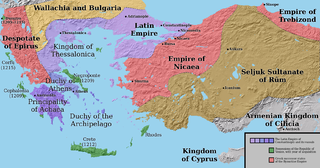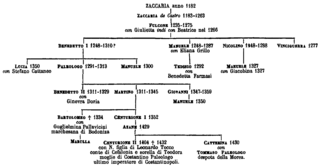| Look up Zaccaria in Wiktionary, the free dictionary. |
The Zaccaria family was an ancient and noble Genoese dynasty.
Contents
Zaccaria may also refer to:
| Look up Zaccaria in Wiktionary, the free dictionary. |
The Zaccaria family was an ancient and noble Genoese dynasty.
Zaccaria may also refer to:
| This disambiguation page lists articles associated with the title Zaccaria. If an internal link led you here, you may wish to change the link to point directly to the intended article. |
Year 1304 (MCCCIV) was a leap year starting on Wednesday of the Julian calendar.

The Principality of Achaea or Principality of Morea was one of the three vassal states of the Latin Empire which replaced the Byzantine Empire after the capture of Constantinople during the Fourth Crusade. It became a vassal of the Kingdom of Thessalonica, along with the Duchy of Athens, until Thessalonica was captured by Theodore, the despot of Epirus, in 1224. After this, Achaea became for a while the dominant power in Greece.

Centurione II Zaccaria, scion of a powerful Genoese merchant family established in the Morea, was installed as Prince of Achaea by Ladislaus of Naples in 1404 and was the last ruler of the Latin Empire not under Byzantine suzerainty.
The Lordship of Chios was a short-lived autonomous lordship run by the Genoese Zaccaria family. Its core was the eastern Aegean island of Chios, and in its height it encompassed a number of other islands off the shore of Asia Minor. Although theoretically a vassal of the Byzantine Empire, the Zaccaria ruled the island as a practically independent domain from its capture in 1304 until the Greek-Byzantines recovered it, with the support of the local Greek population, in 1329.

Martino Zaccaria was the Lord of Chios from 1314 to 1329, ruler of several other Aegean islands, and baron of Veligosti–Damala and Chalandritsa in the Principality of Achaea. He distinguished himself in the fight against Turkish corsairs in the Aegean Sea, and received the title of "King and Despot of Asia Minor" from the titular Latin Emperor, Philip II. He was deposed from his rule of Chios by a Byzantine expedition in 1329, and imprisoned in Constantinople until 1337. Martino then returned to Italy, where he was named the Genoese ambassador to the Holy See. In 1343 he was named commander of the Papal squadron in the Smyrniote crusade against Umur Bey, ruler of the Emirate of Aydin, and participated in the storming of Smyrna in October 1344. He was killed, along with several other of the crusade's leaders, in a Turkish attack on 17 January 1345.

Benedetto I Zaccaria was an Italian admiral of the Republic of Genoa. He was the Lord of Phocaea and first Lord of Chios, and the founder of Zaccaria fortunes in Byzantine and Latin Greece. He was, at different stages in his life, a diplomat, adventurer, mercenary, and statesman.

Paleologo Zaccaria was the Lord of Chios and Phocaea, as well as other Aegean islands from 1307 until his death.
The surname Zacharias, and various related forms, are derived from the Hebrew given name Zechariah People with this surname or its variants include:

Jacopo Gattilusio was the third Lord of Lesbos. He was the eldest son of Francesco II of Lesbos, whom he succeeded as lord of the island on 26 October 1404.

The Zaccaria family was an ancient and noble Genoese dynasty that had great importance in the development and consolidation of the Republic of Genoa in the thirteenth century and in the following period. The Zaccarias were characterized by, according to scholarly handwritten documents of the time, having broad intelligence and their effective way of maintaining political power through manipulation.
Centurione I Zaccaria (1336–1376) was a powerful noble in the Principality of Achaea in Frankish Greece. In 1345 he succeeded his father, Martino Zaccaria, as baron of Damala and lord of one half of the Barony of Chalandritsa, and in 1359 he acquired the other half. In about 1370 he was named Grand Constable of Achaea and received also the Barony of Estamira. He also thrice held the post of bailli (viceroy) for the principality's Angevin rulers.
Benedetto II Zaccaria was the co-Lord of Chios, as well as many other Aegean islands from 1314 until ca. 1325.
Leonardo II Tocco was a scion of the Tocco family and lord of Zakynthos, who played an important role as a military leader for his brother, Carlo I Tocco, in early 15th-century western Greece.
Manuele Zaccaria was the Genoese lord of Phocaea and its profitable alum mines, which he received as a fief from the Byzantine Emperor, from 1275 until his death in 1287/88. He was succeeded by his brother, Benedetto I Zaccaria.
Leo Kalothetos was a provincial governor of the Byzantine Empire.
Andronikos Asen Zaccaria or Asanes Zaccaria was a Frankish lord of the Principality of Achaea in southern Greece.
John Asen Zaccaria or Asanes Zaccaria was the bastard son of the last Prince of Achaea, Centurione II Zaccaria. From 1446 on, he was kept imprisoned in the Chlemoutsi castle by the Byzantine Despot of the Morea, Thomas Palaiologos. In 1453, however, he managed to escape, and taking advantage of a widespread revolt against the Despots, seized the castle of Aetos, claiming his father's title. In 1454, however, faced with the combined forces of Despot Thomas and his Turkish allies under Turahan Bey, he abandoned the fortress and fled to the Venetian stronghold of Modon.
The Lordship of Phocaea was founded after in 1275, when the Genoese nobleman Manuele Zaccaria received the twin towns of Old Phocaea and New Phocaea as a fief from the Byzantine emperor Andronikos II Palaiologos. The Zaccaria family amassed a considerable fortune from their properties there, especially the rich alum mines. The Zaccaria held the lordship until 1340, when it was repossessed by the Byzantines under Andronikos III Palaiologos.
Stephen Zaccaria was the youngest brother of the last Prince of Achaea, Centurione II Zaccaria, and Latin Archbishop of Patras from 1404 until his death in 1424.
Tedisio Zaccaria was lord of Thasos and governor of Phocaea from 1302 to 1307. A descendant of the important Genoese family of Zaccaria, he was the son of Manuele Zaccaria and Clarisia Fieschi. His father was the brother of Benedetto I Zaccaria, the founder of Zaccaria fortunes in Byzantium and Latin Greece.